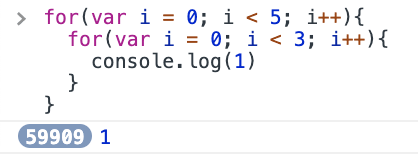Pop Quiz!
Which of these is an infinite loop?
And guess many times console.log will be printed.
A: let 5x3 Loop
for(let i = 0; i < 5; i++){
for(let i = 0; i < 3; i++){
console.log(1)
}
}
B: var 5x3 Loop
for(var i = 0; i < 5; i++){
for(var i = 0; i < 3; i++){
console.log(1)
}
}
C: var 5x5 Loop
for(var i = 0; i < 5; i++){
for(var i = 0; i < 5; i++){
console.log(1)
}
}
D: let 5x5 Loop
for(let i = 0; i < 5; i++){
for(let i = 0; i < 5; i++){
console.log(1)
}
}
Answer
Which of these is an infinite loop?
B: var 5x3
Guess many times console.log will be printed.
A: let 5x3 - 15 times
B: var 5x3 - Infinite times
C: var 5x5 - 5 times
D: let 5x5 - 25 times
Did any of the answers surprise you? I was!
🧐 What, but why? The difference between let and var.
< flashback >
A junior dev came up to me for help with a bug in his Javascript code that's causing a memory error, my intuition told me that there was an infinite loop somewhere.
One of the nested loops stood out as a red flag to me:
for(let i = 0; i < 5; i++){
for(let i = 0; i < 5; i++){
// some code
}
}
I said - Hey, you're using the same variable name for outer and inner loop, this is going to cause an infinite loop.
JD: Huh? How come?
Me: Because the inner loop is reseting i to 0, causing the outer loop to never exit. Come let's try this in the console, it's faster to just see it.
To my surprise, there wasn't an infinite loop, we got this:
console.log was printed only 25 times.
Me: Hm...? That's odd. (Then I realised that the code uses let instead of var.) Maybe... the infinite loop only happens if you use var instead of let.
We changed let to var, and ran it again:
console.log was printed only 5 times.
Us: Wait whuut? Why it is printing only 5 times?
Me: ... Ahhh, that's because since this example uses var instead of let. let allows you to safely declare scoped variables with the same name. But when you use var to declare variables with the same name in different parent-child scopes, they all reference the same thing. So here, when you use var, the inner loop is sharing the same i as the outer loop. Meaning, when the inner loop counts i up to 5 and exits, the outer loop exits immediately because it's i counter is set to 5 by the inner loop.
JD: Ohh... okay, then what if we set the inner loop to exit when i is 3? I guess that produces an infinite loop?
Me: Let's find out.
console.log was printed way beyond 15 times, and crashed the browser.
Us: 🙌 We got an infinite loop!
And what if we change var to let now?
console.log was printed only 15 times.
JD: Ok, cool. But what's the use case of var then?
Me: Ah that's a good question. 🤔 ...none actually. There isn't a good use case for var now that ES6 introduced let. var is just how we used to declare variables - but then there's this problem with variables leaking out of their scope - hence let was proposed. Don't ask me why they decided to name the keyword let. And this is why our eslint is configured to enforce let over var. :)
JD: Oh! Ok... so if this loop isn't causing the memory error, so what's causing it? (That turned out to be something else altogether.)
< /flashback >
Ah thinking back, we have it good now with ES6.






















